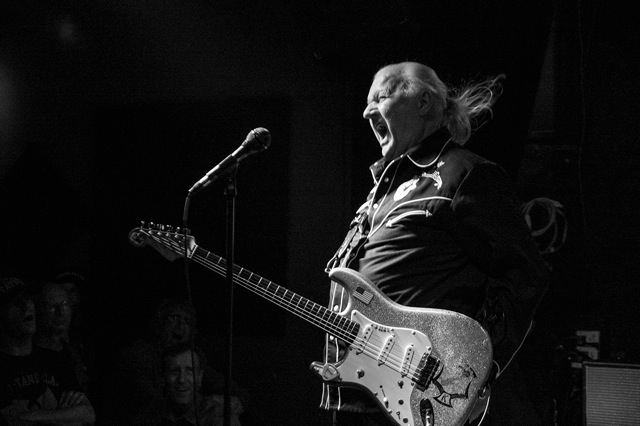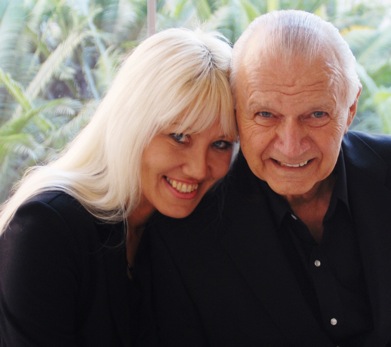
The fast and fierce guitar solos that made Dick Dale famous came far ahead of their time. And as a pioneer of guitar reverb and the surf-rock sound, he’s earned the title “King of the Surf Guitar.” His musical honors range from the traditional (a place in the Nashville Musican’s Hall of Fame), to the remarkably cool (his 1962 recording of “Misirlou” kicks off Quentin Tarantino’s Pulp Fiction), to the bizarre (he inaugurated Disneyland’s Tomorrowland by shredding his stratocaster on top of Space Mountain). But Dick Dale is not yet satisfied. He told me, “There’s an old saying: ‘your performance is only as good as your last one.’ Well I don’t believe that. I change that around. I say, your performance is only as good as your next one.”
His next one is this Wednesday, August 6th, at the Middle East Downstairs. Dale was born in Southie and raised in Quincy, MA, so as he put it: “I’m coming back to my old town.”
Throughout the interview, Dale spoke in terms of “we.” By this, he refers to himself and his wife/nurse/manager, Lana Dale, whom he calls “the angel of my life.” Lana was present throughout the interview as a quiet voice in the background. I heard her chime in occasionally to remind Dick what venues they sold out and how quickly, to mention certain details of his cancer treatments, and to make sure I sent my complete address for a Dick Dale t-shirt. And he’d pause to make asides to her. They seem to share a constant dialogue. Dick told me Lana saved his life; she’s a trained nurse who takes a leading role in his treatments, so I believe him. Dick suffers from diabetes and the extensive after-effects of two bouts of rectal cancer, along with the radiation and chemotherapy that comes with it. Lana has M.S., fibromyalgia and a tumor on her thyroid. Both not only endure their illnesses while touring across the country, but do so without the aid of pain medications.
When we spoke on the phone, Dick Dale had no lack of energy. This should not surprise those who’ve seen him play. An easy musician to interview, he talked from the heart for forty minutes with little prompting. As he put it, “When people ask me what time it is, I have a tendency to tell them how to build a clock.” He spoke candidly about his stoma bag, sang rhythms, and explained the outreach to the ill that now compels Lana and him forward.
Lana Dale called me from a cell phone as they drove through Pennsylvania. She asked if I was ready for the interview and, of course, I was. They pulled over and soon I heard endearing

Dick and Lana Dale
ly everyday fumbling with a Bluetooth earpiece as Dick Dale came to the phone.
Lana Dale: Don’t you do it while you’re––
Dick Dale: Can’t get it in my stupid ear…
Allston Pudding: Hi is this Dick Dale?
DD: Yeah. Hold on. I’m trying to put this in my stupid ear….
After a quick volume adjustment, our interview was underway.
AP: Who are you playing with these days?
DD: Geez, I got a ton of players that have gone through the Dick Dale School of Pain. When one can’t make it, then I call up another fella and he comes in. They’ve been trained by me, the way I want them to play. Everything I do is spontaneous––I don’t follow a list. They gotta keep watching me all the time because I’m constantly changing in the middle of songs. It keeps people paying attention. You know––“Holy crap what are they doing now!”
AP: I like that about your performances, watching them try to keep up. Do you just play whatever you feel like playing next or is how you choose the songs more complicated than that?
DD: Well when you’re playing, you’re a nervous wreck because you’re saying, “What am I going to do next to make them clap as loud, yell as loud as they’re doing?” You don’t want to let it drop. You don’t want to let it slow down. So my mind just keeps thinking about different rhythms to change to and that’s what keeps the crowd really going. Then I look at the audience and I can tell what genre to get into. I see a guy with a cowboy hat, I play Johnny Cash. When I was playing my trumpet and sax, I’d play Harry James or Louie Armstrong.
Now I have my chromatic harmonica, which I drop in and they never expect it. I drop into––honey, look at all the motorcycles over here––I drop into a boogie-woogie. I do a mixture of notes like (sings a lick). And people go “Holy crap, how is he doing that?” It keeps their attention and it always brings their applause to let me know they can feel what I’m ejecting. That’s what it’s all about: to make people in front of you feel what you feel. You gotta learn how to do that. It’s called being truthful when you play, truthful to the rhythms that people can tap their feet to. On Connecting with Fans Dealing with Illness
DD: We’re on the road trying to help the same people that come to my concerts and have the diseases we have. They send us their pictues. Lana gets 2,000 emails a week and she answers them. It does something to help them. So when they come to my concert they say, “Dick, hey remember I saw you last year––we were talking about my operation! How you doing?” We talk about it. We laugh about it. We swear about it.
What we do is we get it out of their minds so that they’ll get off the bed and help somebody else. While they’re helping somebody else, they’re not thinking about the pain they’re going through. I learned this through the martial arts. Since I was 18 years of age, it’s been a part of my life. I teach them how to focus away from the pain, like Lana and I who are a couple of sickies taking care of each other. And I’m still playing and we just got another triple-platinum award for Pulp Fiction. We got another triple-platinum award for “Pump It” from the Black Eyed Peas––I did the music that they wrote words to.
Every day that we wake up, we go forward and do what we have to do. I cannot stop playing because if I do I will not get the $3,000 a month to buy my attachments [for the stoma bag]. I’ll get an infection and I will die. These poor people that just receive money from their retirement or from Medicare, they can’t afford what I have to come up with. They’re not on the road like me and Lana, so we try to help them as much as we can. I’ve had them come out on a gurney to visit me while I’m performing. They come in wheelchairs. So we look at each other like the great maker has kept us alive to help these people, to be like Johnny Appleseed––I don’t know if you’ve ever heard the story––to spread the good seeds of how to live.
Dick spoke about the importance of eating right and of keeping toxins out of his body.
AP: That’s a rule for your crew right? that they can’t take any drugs or drink?
DD: That’s right. I don’t allow any drinking, no drugs––I’ve never had a drug in my body in my life. I’ve never put alcohol in my body in my life. I haven’t eaten red meat for forty years. We don’t smoke. Lana is the same way. We eat properly to avoid the toxins that come into your body from junk eating.
Dick Dale uses baking soda in water and peanut butter to keep his blood sugar down. He drinks hot water and lemon in the morning to detox and takes hydrogen peroxide with water as a measure against cancer.
DD: We do things like that and we’re still alive. And we can bitch about the pain: “Oh God, why can’t I have a pain-free day?” My poor wife has had pain since she was 14 because of the MS and she his fibra miralgia and she has a tumor in her thyroid. That’s a death sentence.
AP: I can’t imagine traveling helps with any of that.
DD: Well, we don’t think about it. We think about who we can help. Yes, we don’t get sleep. I used to have to get up every hour to urinate. That’s why I had to catheterize myself. Lana, when she goes to bed at night, she’s in such pain that she’s crying and she prays to her maker. But what I do is I massage her and I grab the pain where the attack starts. She goes through tremendous pain while I’m stopping it. And then BOOM, she’s back to normal, but she really gets tremendous pain in her heart, in her chest while I’m doing it, but it stops it.
AP: You’ve learned how to take care of each other.
DD: Our maker put us both together to help each other. And we’re never out of each other’s sights ever. We’ll never leave each other’s sight because she’s afraid of me falling and I’m afraid of her falling… but we mustn’t give up. It’s a mixture of everything––all our components that have something to do with why we are in existence
I heard Lana say, “Johnny Appleseed.”
DD: Yeah the Johnny Appleseed syndrome there. You’ll have to witness it––I pay homage at the end. I play a song called “Amazing Grace.” I never follow a list ever––never have, never will––so every night it’s different. But I always pay homage at the end with “Amazing Grace” on my guitar.
On Training Backing Musicians
DD:In the Shaolin temple, they never allow you to touch the skin of a drum until you can tongue the rhythm that you’re going to play. Many people try to memorize what they play, but when you tongue it to your brain, then it’s like tattooed in your body. You’ll never make a mistake. They gotta train with me for thirty days minimum. I had a bass player, Ron Eglit, an old buddy of mine––he’s been with me for years––when he was interviewed he said, “It took me seven years to understand what Dick Dale was trying to put in my brain.” Right now I’ve got Sam Bolle on bass who has worked with me for many, many years and I have Jerry Porter on drums. Jerry’s been with me the past few years now on tours. I’ve had other people, but they gotta learn the Dick Dale method, so you’ll always hear the Dick Dale sound the way it’s supposed to be played.
AP: Great. It’s good to count on that.
DD: Oh yeah. it’s always the same, but it’s also, once again, an ever-changing show.
AP: Is there anything you want to say to the people coming out?
DD: I’ll just say I want to thank everyone for all the years. I’ve watched them grow up, get married, have children. I’ve seen their children grow up, have children. It’s like I’ve been borrowing someone else’s body while I’ve been on this planet.
I want to thank them all for feeling what I do on that stage. I can only say this: to experience is to know, to know is to understand, to understand is to tolerate, to tolerate is to have peace. Third eye. 
And then, I want to leave them with this saying, from one of my great masters, that thoughts become words––so be careful––words become actions. Actions become habits. Habits becomes your character. And your character becomes your––(pauses) when you spoke you threw me right off, Sweetheart––your destiny. Your character becomes your destiny. So think before you speak.
Thank you for supporting me all these years. Now you’re taking care of Lana and you’re taking care of me and the only way that we can pay you back is what we can try to do for you to enjoy. Listen to the thunder.
